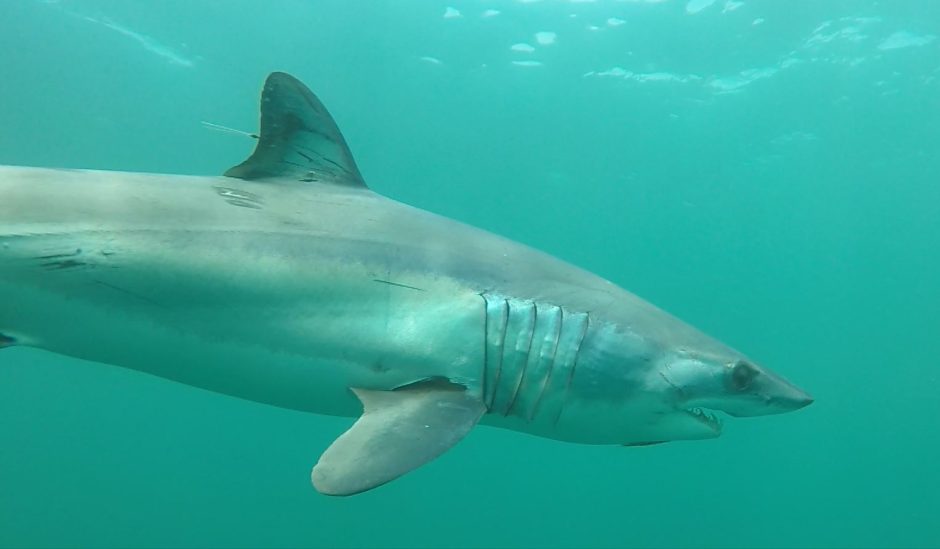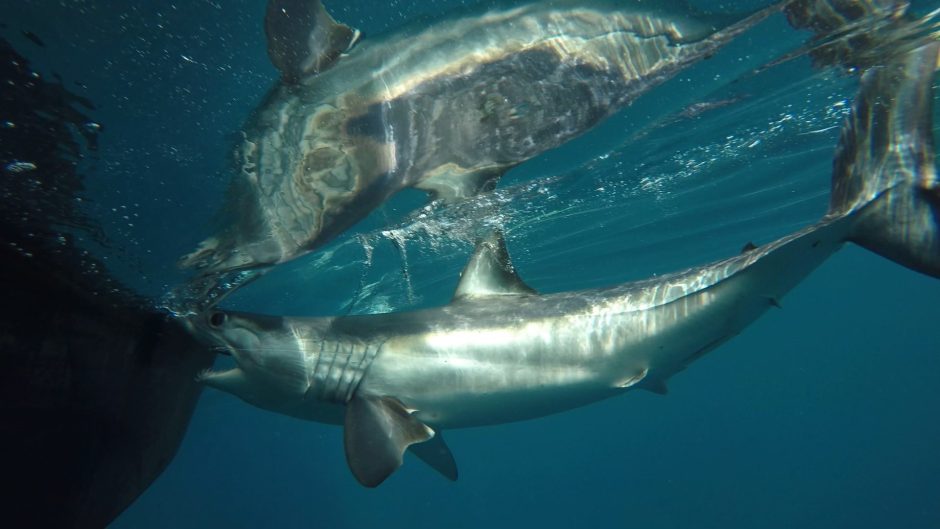By Eric Stann


June 17, 2025
Contact: Eric Stann, StannE@missouri.edu
Photos courtesy Michael Byrne
Growing up outside New York City, Michael Byrne was hooked on sharks from the start. As a child, he’d press play repeatedly on the same worn-out VHS tape, completely transfixed by a PBS documentary on the sleek, powerful predators.
His first real encounter came at the New York Aquarium in Brooklyn, where he watched sharks cruise by just inches away. But his fascination became a lifelong passion after spending time fishing with his grandfather off Long Island, where he encountered sharks in the wild for the first time.
“Like most kids my age, I was obsessed with sharks and dinosaurs,” he said. “The difference is, I never grew out of it.”
Today, Byrne is a faculty member at the University of Missouri, where his work on wildlife ecology is anything but one-dimensional. From soaring raptors to curious racoons and elusive wolves, his research stretches across a broad spectrum of species. It’s a deliberate choice, he said, because he loves to get his hands into “a little bit of everything.”
Over the years, he’s tracked wild turkeys through Missouri’s forests, studied hawks in the skies over California and researched grass carp in the waters of the Great Lakes. But no matter where his research takes him, one creature continues to hold his heart — the shark, especially the lightning fast, sharp-toothed mako.
For Byrne, an associate professor in Mizzou’s College of Agriculture, Food and Natural Resources, sharks are more than a scientific interest: They represent a lifelong fascination that blends biology, mystery and pop culture allure.
“Sharks have always fascinated me,” he said. “They’re incredibly powerful and play a crucial role in maintaining the balance of marine ecosystems. Yet they’re deeply misunderstood.”
Rewriting the narrative
Sharks are often portrayed in the public’s imagination as dangerous predators, mostly because of movies and TV shows. Byrne points out that while “Jaws” and “Shark Week” have gotten people to start talking about sharks, they’ve also created misunderstanding.
“‘Jaws’ helped make sharks famous, but it also made people afraid of them,” he said. “Even Peter Benchley, the author of the novel the movie is based on, later dedicated much of his life to shark conservation because he saw the unintended impact his story had.”
While Byrne appreciates the role the Discovery Channel’s “Shark Week” has played in sparking public interest about sharks, he believes its focus has shifted in recent years from science toward more dramatic storytelling.
“You’ll get a brief segment on conservation, but it’s often followed by sensationalized content that tends to prioritize drama over science,” he said. “It’s a missed opportunity to educate the public — and that shift feeds fear more than it fosters understanding.”
Despite these challenges, Byrne is encouraged by these mediums driving increased public interest in shark science.
“The fact that people are talking about sharks at all is a positive sign,” he said. “Now we need to replace the myths with facts.”

Tracking sharks, advancing science
Byrne’s research contributes to the field of shark ecology by focusing on movement and behavior.
Using satellite tagging technology, Byrne and other scientists can now monitor individual sharks across entire oceans in real time. By gathering environmental data such as temperature, depth and location, they’re gaining a greater understanding of where sharks go and how they interact with their environment.
“Fifty years ago, when ‘Jaws’ debuted in theaters, we had almost no idea about how far sharks traveled,” he said. “Now we’re seeing transoceanic migrations and seasonal patterns that are critical for understanding their life history and for designing effective conservation strategies.”
Conservation through education
Beyond his lab and fieldwork, Byrne sees education as a cornerstone of effective conservation efforts for sharks.
“As apex predators, sharks keep marine ecosystems healthy by regulating species below them in the food web,” he said. “Sharks are indicators of ecosystem health because they are dependent on a functional food chain below them. Their decline, often due to overfishing or bycatch, can trigger cascading ecological consequences or be a sign of other underlying ecological problems.”
He notes that people’s everyday decisions — even for those living far from the ocean — can influence marine conservation.
“Here in Missouri, you’re not near a coastline, but the seafood you buy still matters,” he said. “Supporting sustainable fisheries helps protect sharks and other species.”
Looking into the future, Byrne hopes that both public dialogue and media representation will reflect the true nature of sharks — as complex, essential and awe-inspiring creatures.
Ultimately, Byrne’s mission is clear: to help shift the cultural narrative from fear to respect, and to ensure sharks continue to thrive in the world’s oceans for generations to come.



